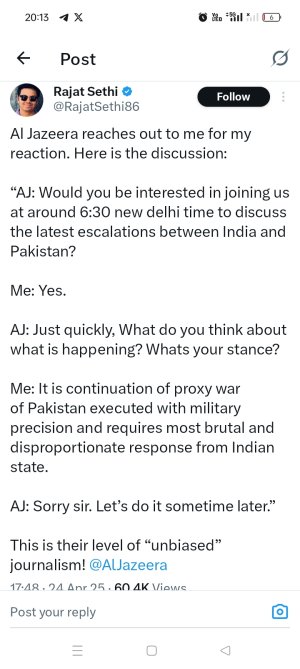- Joined
- Sep 4, 2015
- Runs
- 2,900
- Post of the Week
- 2
Let me start by stating clearly: I do not believe the Pakistan Army or the ISI are behind this incident. The situation is highly volatile, and any such action would risk immediate and uncontrollable escalation. At present, the military leadership stands to gain nothing from such a move, nor are they in a position—strategically or operationally—to initiate or execute an operation of this magnitude.
This development appears to have caught them off guard. It’s something they will now be forced to respond to and manage, rather than something they orchestrated.
India has stepped onto the escalation ladder, and only sustained and intense pressure is likely to compel it to deescalate. While the five points outlined by the Indian Foreign Office may seem like a cautious start, it would be both unwise and a strategic misstep for Pakistan to respond passively. A robust non-kinetic response is essential.
In the short to medium term, Pakistan does not face any immediate existential threats, as India must still overcome significant technological, environmental, and logistical challenges before escalating the water issue further. The rest of the stuff in Indian response is BS and already non-existent.
Pakistan’s potential options in response to India may include:
Simultaneously, the Pakistan Army must take decisive internal steps: the immediate release of Imran Khan is imperative. The political space must be cleared to prepare for any escalation. The ISI should refocus on its core national security responsibilities rather than being entangled in domestic surveillance and political manipulation. Continuing to detain Imran Khan under the current circumstances would be a grave misjudgment—should kinetic escalation occur, the Army cannot be expected to simultaneously manage war, internal instability, and counterinsurgency.
Military preparedness is essential—political rhetoric without credible defense capability is futile. Pakistan must signal strength, not indecision.
Therefore, Pakistan should promptly conduct a public test of its next-generation hypersonic missile systems and make it unequivocally clear that any Indian kinetic action will be met with a swift, decisive, and disproportionate response.
Neither India nor its Western partners can afford a destabilized Indian market. Pakistan must leverage this fact strategically.
This development appears to have caught them off guard. It’s something they will now be forced to respond to and manage, rather than something they orchestrated.
India has stepped onto the escalation ladder, and only sustained and intense pressure is likely to compel it to deescalate. While the five points outlined by the Indian Foreign Office may seem like a cautious start, it would be both unwise and a strategic misstep for Pakistan to respond passively. A robust non-kinetic response is essential.
In the short to medium term, Pakistan does not face any immediate existential threats, as India must still overcome significant technological, environmental, and logistical challenges before escalating the water issue further. The rest of the stuff in Indian response is BS and already non-existent.
Pakistan’s potential options in response to India may include:
- Suspending the Shimla Agreement;
- Referring the Indus Waters Treaty to the International Court of Justice.
Simultaneously, the Pakistan Army must take decisive internal steps: the immediate release of Imran Khan is imperative. The political space must be cleared to prepare for any escalation. The ISI should refocus on its core national security responsibilities rather than being entangled in domestic surveillance and political manipulation. Continuing to detain Imran Khan under the current circumstances would be a grave misjudgment—should kinetic escalation occur, the Army cannot be expected to simultaneously manage war, internal instability, and counterinsurgency.
Military preparedness is essential—political rhetoric without credible defense capability is futile. Pakistan must signal strength, not indecision.
Therefore, Pakistan should promptly conduct a public test of its next-generation hypersonic missile systems and make it unequivocally clear that any Indian kinetic action will be met with a swift, decisive, and disproportionate response.
Neither India nor its Western partners can afford a destabilized Indian market. Pakistan must leverage this fact strategically.











